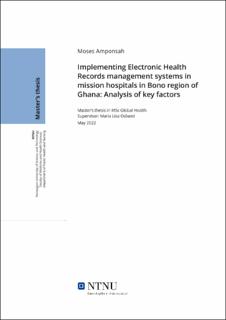| dc.description.abstract | Implementation of Electronic Health Records management systems in the health care system in Ghana is an appropriate way to keep patient information safe and easy to retrieve at all times. The study aims to explore and analyse the key factors that influence the implementation of an EHR management system in mission hospitals in the Bono region of Ghana. The study was hinged on the Technology, Organisation and Environmental (TOE) model by Tornatzky & Fleischer as the key theoretical framework.
The study relied mainly on primary data sources, where structured questionnaires were used to obtain the primary data for the study. The target population (N) received from the two (2) mission hospitals was 180 healthcare professionals. The researcher adopted a confidence interval of 95 per cent (1.96 z-score) and a 5 per cent (0.05) acceptable margin of error for the sample size determination. Therefore, the study's estimated sample size (n) was 123 participants.
The researcher considered correlation and regression analysis to determine the association between the decision to implement an EHR management system and other possible predictor factors. The data suggest that all three potential predictors (technological, organisational and environmental factors) correlated positively with the outcome variable (decision to implement an EHR). The result shows that the predictors collectively can account for 45% of the variance in the outcome variable, p < .001. Furthermore, the data suggest the unique individual contributions of the predictors; the result shows that technological factors (β=0.142, p=0.125), organisational factors (β=0.293, p=0.01) and environmental factors (β=0.483 p<0.001) positively predict the implementation of an EHR management system.
Moreover, this study shows that for a facility to adopt an EHR management system, premium emphasis has to be placed on the environmental factors since the survey revealed the environmental factors as the most substantive predictor of the outcome variable (decision to implement EHR). | |
